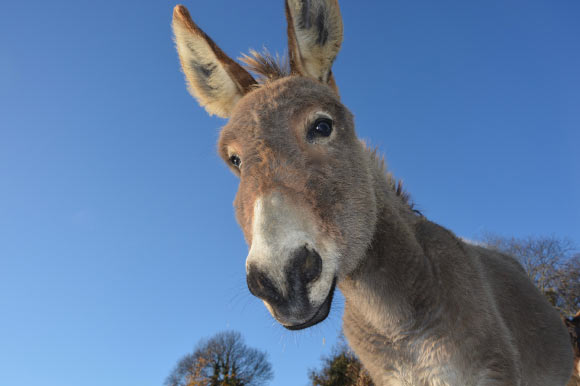Domestic donkeys (Equus asinus) have been important to humans for thousands of years, being the primary source of work and transport for many cultures. Unlike horses, little was known about their origin and domestication. A research team led by Université Paul Sabatier scientists has sequenced the genomes of 207 modern and 31 ancient donkeys, as well as 15 wild equids, and found evidence of an eastern African origin over 7,000 years ago.

Todd et al. found a strong phylogeographic structure in modern donkeys (Equus asinus) that supports a single domestication in Africa around 5000 BCE, followed by further expansions in this continent and Eurasia and ultimately returning to Africa. Image credit: JackieLou DL.
Domestic donkeys have been important to humans for thousands of years, providing a source of animal labor and long-distance transport for many cultures.
However, despite their importance to ancient pastoral societies across Africa, Europe and Asia, little is known about their long history with humans, particularly regarding their origin, domestication and the impact of human management on their genomes.
Although these creatures remain essential for developing low- and middle-income communities, particularly those in semi-arid and upland environments, they remain notably understudied, likely due to their currently undervalued status and loss of utility in modern industrialized societies.
To address this gap, Dr. Evelyn Todd of the Université Paul Sabatier and colleagues sequenced 238 modern and ancient donkey genomes.
They found strong phylogeographic evidence supporting a single domestication event in eastern Africa more than 7,000 years ago (5000 BCE).
This was followed by a series of expansions throughout Africa and into Eurasia where subpopulations eventually became isolated and differentiated, perhaps due to the aridification of the Sahara.
Eventually, genetic streams from Europe and the Near East found their way back into western African donkey populations.
Additionally, the authors uncovered a new genetic lineage from the Levant region that existed roughly 2,200 years ago and contributed increasing gene flow toward Asian donkey populations.
Donkey management involved inbreeding and the production of giant bloodlines at a time when mules were essential to the Roman economy and military.
“These discoveries call for new archaeological digs to find the initial source of domestication in Africa, as well as the sequencing of other early donkey genomes on both shores of the Mediterranean sea, to better understand the role of this animal in the history of trade between Europe and North Africa,” they said.
The study appears in the journal Science.
_____
Evelyn T. Todd et al. 2022. The genomic history and global expansion of domestic donkeys. Science 377 (6611): 1172-1180; doi: 10.1126/science.abo3503







